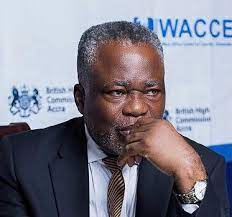The National Theatre of Ghana, located in Accra, stands as a cultural beacon and a symbol of artistic expression in the country.
Established in 1992, it was designed to promote the performing arts and serve as a venue for various cultural performances, including theater, dance, and music.
However, in recent years, the theatre has faced numerous challenges that have cast uncertainty over its future.
The National Theatre was constructed to provide a dedicated space for the performing arts in Ghana, reflecting the country’s rich cultural heritage.
Over the years, it has hosted countless productions, festivals, and events, becoming a hub for artists and audiences alike. The theatre was envisioned as a platform to elevate Ghanaian arts nationally and internationally.
Government support has fluctuated, and the theatre often struggles to secure the necessary resources for maintenance, programming, and staff salaries. This financial instability has led to a decline in the quality and frequency of performances.
Leadership and management challenges have also plagued the theatre. Frequent changes in administration and a lack of clear strategic direction have hindered long-term planning and vision. This instability affects not only the staff but also the artists who rely on the theatre as a venue for their work.
The National Theatre seems to have been deserted for a long time, but it is now clear that the problems of the one-time national pride go beyond the facility’s walls.
While the exterior and interior amenities deteriorate, officials appear to hinge their salvation on the foreign partner that funded and presented the once iconic facility to the country.
The Deputy Minister of Tourism, Arts, and Culture, Mark Okraku Mantey, revealed that several efforts to liaise with the Chinese government to revamp the National Theatre had been affected by the constant change over the years.
“We keep trying to get support from the Chinese government because they built the facility, but it’s been back and forth because they keep changing their ambassadors.
“It’s been so many years since the facility was built, and some of the technology have become outmoded, and apart from China, it will be difficult to get them from other countries.”
Mark Okraku-Mantey
The rise of alternative performance spaces, including smaller theaters, community centers, and even digital platforms, has intensified competition.
These venues often offer more flexible arrangements and are better suited to the evolving tastes of audiences, leading to a decline in attendance at the National Theatre.
Changes in societal interests and preferences have also impacted the theatre’s relevance. Younger generations are more inclined to engage with contemporary forms of entertainment, such as film and digital media, which overshadow traditional theatre productions.
Implications for the Arts Community

The uncertainty surrounding the National Theatre has far-reaching implications for the broader arts community in Ghana.
As the theatre struggles to maintain its programming, artists find fewer opportunities to showcase their work, which stifles creativity and professional development.
The National Theatre plays a crucial role in preserving and promoting Ghanaian culture. Its decline could lead to a loss of traditional art forms and cultural narratives that are vital to the nation’s identity.
Despite the challenges, several pathways could lead to a revitalization of the National Theatre.
Exploring diverse funding sources, including partnerships with private sector entities, international cultural organizations, and crowdfunding initiatives, could provide the financial stability needed for the theatre to thrive.
Ghanaian playwright and entertainment industry professional, George Quaye weighed in on the ongoing debate regarding the maintenance of Ghana’s National Theatre.
However, in response to Okraku-Mantey’s comments, George Quaye confirmed that, contractually, the Chinese government is responsible for the theatre’s maintenance for a specified number of years.
“When you’re a public officer, you need to explore all channels available to you first before you can offer alternate solutions. When you knock on that door for a number of months or weeks or whatever and you don’t get results, then you can start looking for alternate solutions, which I believe the ministry and all the leadership at the theatre, the board and everybody have been doing.”
George Quaye
He acknowledged that the government has taken steps to maintain the theatre, such as purchasing new air conditioners with state funds.
Increasing community involvement and outreach programs help rebuild audience loyalty and attract new patrons. Collaborating with schools, local artists, and community groups fosters a sense of ownership and connection to the theatre.
Embracing digital platforms for performances and marketing expands the theatre’s reach beyond physical boundaries. Hybrid events that combine live and virtual elements cater to diverse audience preferences.
Establishing a stable and visionary leadership team is crucial for the theatre’s future. Implementing best practices in governance and management helps create a more sustainable operational model.
The National Theatre of Ghana stands at a crossroads, facing significant challenges that threaten its future. The theatre remains a vital institution for preserving and promoting Ghanaian culture, and its success is essential for the health of the arts community.
As stakeholders come together to address these challenges, the hope is that the National Theatre emerge stronger and more relevant in the years to come.
READ ALSO: Government’s Delay in Clearing Dialysis Consumables Spells Doom


















